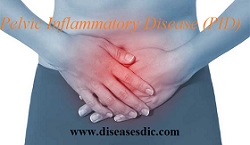Introduction
The pelvic inflammatory disease is the inflammation of female reproductive organs such as the uterus, ovaries, cervix, endometrium, and the fallopian tubes, due to the infection of sexually transmitted bacteria. Sometimes it also caused by the normal bacteria present in the vagina. This bacterium enters via the vagina and reaches to the uterus, fallopian tube, and ovaries. If PID is not treated for long-term, then it can lead to the formation of scars with fibrous band growth between the surrounding organs and tissues.
Pathophysiology
PID is often associated with the infection of microorganisms which starts from the cervix or vagina to the endometrium, then to the fallopian tubes and later into the contiguous structure called ovaries.
The causative agents that are most responsible for infection of reproductive organs are as follows.
- Chlamydia trachomatis.
- Neisseria gonorrhoeae.
- Polymicrobial infections also occur in rare cases.
- Mycobacterium tuberculosis and Actinomyces species are very less common causative bacteria in PID.
Causes of PID
- The root causes of PID are mostly by sexually transmitted infections such as gonorrhea and chlamydia.
- It can also be transmitted from the non-sexually transmitted infections such as bacterial vaginosis.
- PID can also occur after the rupture of an appendix.
- In some cases ruptured bowel infections can also cause PID.
- Unprotected sex can cause PID very easily.
- It can also result from a termination of pregnancy or childbirth.
- Having past history of PID and STD.
Risk factors of pelvic inflammatory disease
- Childbirth, abortion or miscarriage can make the vaginal mouth unclosed. This makes the high possibility of bacteria to enter into the reproductive organs.
- An intrauterine device (IUD): It is a type of birth control placed into the uterus, which increases the risk of developing PID.
- An endometrial biopsy also increases the risk of PID due to some bacterial infections during the biopsy.
- Appendicitis: It slightly increases the risk because the infection from appendices is spread over the pelvic regions.
- Douching: Douching is washing or cleaning out the vagina with water or other mixtures of fluids. Frequent douching may be at risk for developing PID.
- Women who are having several sexual partners.
- People who do not use barrier contraceptives
- Women who are under age of 25years and sexually active.
Incidence of PID
- It is much difficult to assess the exact incidence of PID affected women by the different specialist.
- Total measures of 10-12 cases per 1000 women of reproductive age were often affected.
- PID was responsible for one in 60 general practitioner consultations by women under the age of 45 years.
- About 10 to 15 percent of women with chlamydia and gonorrhea develop PID as the secondary infection.
- In the United States, approx. 1 million females are afflicted with PID per year, and nearly 275,000 of them are thought to be hospitalized.
Symptoms
Many women’s doesn’t have any signs and symptoms. When the condition becomes mild to serious, symptoms may arise include:
- Pain in the abdomen is the most common symptoms
- Pain during sex
- Irregular and long-lasting periods
- Unusual discharge with bad odor from Virgina
- Fell very tired
- Pain when you pee or hard time to go
- Fever (temperature 38° C [100.4° F] or higher) or chills
- Fainting and vomiting
- Often urination
Complications of pelvic inflammatory disease
PID sometimes leads to long-term problems when it is not treated in the early stage.
- Abscess in fallopian tubes and ovaries
- Long-term pain in pelvic and around the abdomen
- Ectopic pregnancy which means the fertilized egg implants itself outside the womb, mostly in one of the fallopian tube
- Infertility
- Recurrent pelvic inflammatory disorder
Diagnosis and test
To diagnose PID doctors usually, do a physical examination to check the signs and symptoms of the PID.
If you have abdominal pain, then your doctor may check for:
- Unusual discharge from Virgina
- Abscess or pus in the cervix, near ovaries or fallopian tubes
- Pain or tenderness in your reproductive organs
Tests to diagnose PID include:
- Test for sexually transmitting infection, especially for gonorrhea and chlamydia
- Imaging test or ultrasound test to see the internal organs for the signs of PID
- Urinary tract infection test and test for other conditions that cause PID
Treatment and medications
Treatment for PID includes:
Antibiotics: your doctor may prescribe antibiotics by the combination of two antibiotics. After the laboratory tests, your doctor may prefer medicines based on your severity of the infection. Antibiotic treatment prevents serious complications buy doesn’t give any damage. Antibiotics should be chosen against chlamydia and gonorrhea which are the most common bacterial infection through STI.
Some of the antibiotic which is commonly prescribed by doctors such as
- Ofloxacin
- Metronidazole
- Ceftriaxone
- Doxycycline
Inform your doctor if you’re pregnant because some antibiotic should be avoided during pregnancy period.
Treatment for your partner: To prevent sexually transmitted infections, your partner should be tested and treated before having sex.
Temporary abstinence: Avoid sex intercourse until treatment gets to finish and tests indicate the infection has cleared.
Prevention of pelvic inflammatory disease
Getting prompt treatment for sexually transmitted diseases. The first prevention step is by practicing safe sex.
- You can reduce your PID by having a sexual relationship with only one person. It is called monogamous
- Use condom while having sex
- Get tested for STI before get started into your sex
- The only way to prevent PID is not to have sex
You can reduce your risk by following way:
- Get regular check for STI tests
- Women with multiple sexual partners should be screened
- Sexually active women age 24 or younger, should get screened for chlamydia and gonorrhea
- If you are a new couple, get tested before starting to have sex

